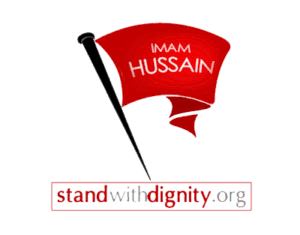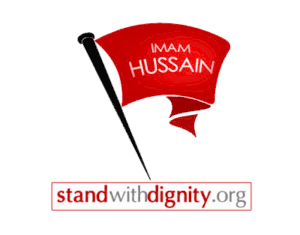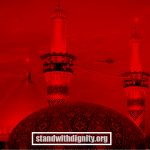By John Andrew Morrow (Ilyas Islam)
The following lecture was delivered in Toronto, Canada, in 1996. It was published as an article in the August 1996 edition of Mahjubah 15:8 (147): 26-28. It was later reprinted in Islamic Insights: Writings and Reviews, an anthology of academic articles, published by Ansariyan Publications in 2012.
To make a sacrifice means to deprive oneself of something, to give something away for the sake of attaining a goal. It is to give away something, often precious, in order to achieve something greater. Often, the reward of that sacrifice is not found in the near future. The goal of sacrifice is purification of the self and thereafter of society. A good society is made up of good people. A corrupt society is made up of corrupt people. So in order to have a good society we must purify ourselves and make sacrifices. If we are pure, our families will be pure. Families are the basis of society; they are its pillar. You cannot build a house on a broken and rotten foundation. If you do, that house will certainly fall. And that is exactly what is happening in Western countries due to corruption. With the help of Allah, and with many sacrifices, we can rebuild this world and make it Islamic. The goal of sacrifice is purification and the reward of purification is Paradise.
If we look back throughout history, within our own period of time, and within our own lives, we find many kinds of sacrifices. Among the pillars of Islam we find sawm, fasting during the month of Ramadan. For thirty days of each year, from dawn to dusk, we deny ourselves the pleasures of life. This is sacrifice. It is to teach us discipline, control, to make our hearts sensitive to the poor and needy. It is to purify our health and to purify our souls. For some people, even eating halal is a sacrifice, because they have certain limits on what they can and cannot eat. Nevertheless, we make the effort to eat halal because it is what is best for us. As Almighty Allah says in the Qur’an: “So eat of the sustenance which Allah has bestowed upon you, lawful and good” (14:115). Among the pillars of Islam we find the obligatory charities of Zakah and Khums.Zakah is an Arabic word meaning “to purify or to cleanse.” By paying Zakah, one purifies one’s wealth of impurities. One could be selfish and not pay Zakah and Khums. But those who pay them understand that it is a sacrifice and a benefit which serves to purify the self and to purify society.
Among those who have made great sacrifices are the ‘ulama’, the scholars of Islam, who dedicate 10 to 15 years of their lives in order to become our mawlanas. Imam Khumayni discussed sacrifice in late 1972, in a lecture he gave in Najaf, Iraq, to an audience of students of the religious sciences. As he told them:
You are young, but you have sacrificed your youth in order to study the religious sciences, even though it will not greatly benefit you from a worldly standpoint. If you devote your precious time and the spring of your youth to the cause of Allah, and this sacred and precise aim, you will not lose anything. On the contrary, your welfare in this world and in the hereafter will be assured.
Among the scholars of Islam, we find an outstanding group of individuals. They are the jurists. They are highly intelligent and dedicated believers who have not only dedicated themselves to 10, 15 or 20 years of study, but who have dedicated their entire lives to acquiring knowledge, teaching, and conducting research. Among them there are some who have gone even further than that. They are those who have struggled to put those teachings into practice. In Iraq, we have Grand Ayatullah Muhammad Baqir al-Sadr, and his sister, Bint al-Huda, who were assassinated for wanting Muslims in Iraq to live under Islam. And of course we have Grand Ayatullah Khomeini who fought many long years, was exiled to Turkey, to Iraq, and to France, facing persecution and attempts on his life, in order to establish and lead the first Islamic State in modern history. Of course, the greatest examples of sacrifice that we have come from the lives of Prophet Muhammad and the members of his family.
The Messenger of Allah faced countless hardships and adversities in order to spread the message of Islam. He was insulted, cursed, accused of being a sorcerer, and he was even stoned by the ignorant inhabitants of Ta’if. We also know that conspiracies were made in order to kill the Noble Messenger of Allah. Imam ‘Ali was willing to give his life for the Holy Prophet. He covered himself with his cloak and laid in his bed so that the Prophet could escape to Medina. Imam ‘Ali was willing to make the supreme sacrifice–to give his life for the cause of Allah–to suffer and be persecuted for the cause of Allah, and to be killed or to die for the cause of Allah. We should not be afraid to say this. Allah says in the Holy and Glorious Qur’an:
And say not of those who are slain in the way of Allah: ‘They are dead.’ Nay, they are living, though ye perceive it not. (2:154)
Think not of those who are slain in Allah’s way as dead. Nay, they live, finding their sustenance in the Presence of their Lord; they rejoice in the Bounty provided by Allah; and with regard to those left behind, who have not yet joined them (in their bliss), they (the martyrs) glory in the fact that on them is no fear, nor have they cause to grieve. They glory in the grace of Allah and the bounty in the fact that Allah suffereth not the reward of the faithful to be lost (in the least). (3:169-171)
And if ye are slain, or die, in the way of Allah, forgiveness and mercy from Allah are better than all they could amass. (3:157)
It is clear from these verses that this supreme sacrifice is better than anything that one could accumulate in this world. In fact, it is better than the whole world and everything in it numerous times.
The Messenger of Allah, the Members of his Family, and their followers faced all sorts of difficulties and made all kinds of sacrifices. In Mecca, many Muslims were tortured and murdered. They faced a boycott for many long and miserable years. Khadijah, may Allah be pleased with her, the wife of the Prophet, died during this period. She had been a great and powerful business woman. She had been successful, but died in a state of misery. She never saw Islam come to power but she sacrificed herself, to help her husband, to help Islam, and to help the holy cause of Allah. Allah says in the Holy Qur’an, in verse one and two of Surah Nasr: “When comes the Help of Allah, and Victory, and thou dost see the people enter Allah’s religion in crowds.” This occurred in Medina. Khadijah never made it that far. But Allah’s promise is true. Sacrifices may have their reward in this life, but maybe not during one’s lifespan. But they certainly have their reward in the next life. And that is sufficient.
One of the most beautiful examples we have of sacrifice is that of Imam al-Hussain, the Lord of Martyrs. The political situation in the life of the Imam was pretty much, in many ways, as it is today. They had a government and leaders that claimed to be Muslim but which were truly anti-Muslim. Yazid, the Caliph, lived in extreme luxury. He was effeminate, wore silk, committed adultery, made fun of the Islamic law, and was well-known for his many corrupt practices. In the first year of his reign, Yazid butchered the descendants of the Most Noble Messenger. In the second year, he sacked Medina, and left his soldiers free to kill and plunder for three days. It should be noted that according to Mawlana Mawdudi, one thousand women became pregnant due to rape. In the third year, Yazid destroyed the Holy Ka‘aba. Yazid wanted to force Imam Hussain to make the pledge of allegiance to him. The Imam refused to do such a thing since that would have been like accepting the devil as God.
Imam Hussain had to leave Medina due to threats on his life. He headed to Mecca, but had to leave also, since Yazid had planned to kill him within the sacred precinct of the Ka‘aba. The day before the beginning of the Hajj or yearly pilgrimage to Mecca, Imam Hussain decided to go in the direction of Kufah, where he had been invited by those who had been the followers of his father. He knew he would never make it, though, and that they would abandon him. He knew his destination was Karbala. He was asked why he was leaving Mecca just before the pilgrimage. He responded that this year, he was going to make a greater pilgrimage: a pilgrimage of blood. And that is exactly what happened.
In the desert of Karbala, Imam Hussain’s small party, which included his wives, children, relatives, and a few close companions, were surrounded by the forces of Yazid which comprised of 40,000 soldiers. They cut off the water to the Imam’s camp on the seventh day of Muharram and the torture of thirst and hunger begun. On the day of Ashura, the tenth day of the month of Muharram, Imam Hussain sent out his followers, one by one, to fight, kill, and die for Allah. Lastly, the Imam came out asking for water for his little baby, ‘Ali al-Asghar, who was dying of thirst. The forces of the enemy quenched the thirst of the infant with a deadly poisoned arrow that pinned the baby’s neck to the Imam’s arm. At last, when the six month old baby was killed, al-Hussain made a prayer, went out into the battlefield, fought bravely, and was martyred. He was decapitated and his head brought to Yazid, who used to poke around at it, and play with it.
Imam Hussain was one of the greatest revolutionaries ever. Although he was not successful physically, he was successful spiritually and religiously. He caused an intellectual revolution and a revival of Islam. Through Imam Hussain’s sacrifice many people came to realize that the Islam of the Umayyad Caliphs was not the true Islam and many returned to the path of the Prophet. Imam Hussain’s uprising gave strength to many and resulted in many following his example and leading bloody rebellions against oppressors and tyrants.
Today our problem is with governments, like Saudi Arabia, who claim to be Islamic, but which have little or nothing of Islamic. Our problem is with “American Islam,” an Islam devoid of politics. If anyone tells you that there is no politics in Islam, then ask them: “What is more political than leading a rebellion against a government?” And that is exactly what Imam Hussain did. And for the sisters, we have an especially good example in Zaynab who was a highly intelligent and eloquent woman who did not fear to speak the truth in the face of the tyrant even though she was degraded, tortured, and abused. Imam Hussain said during his uprising against the deviations of the Umayyad:
I call you to the Book of Allah and the Sunnah of His Prophet… Because the Sunnah has been assassinated and heresy has been resurrected. I have not led this uprising out of joy or because of some personal dissatisfaction… I have arisen to reform the Ummah of my grandfather the Messenger of Allah, to command the good and forbid the wrong, and to follow the path of my grandfather and of my father.
We must understand who Imam Hussain was. The Holy Prophet has said: “Hussain is a part of me, and I am a part of Hussain. Allah loves those who love him.” The Prophet said: “He who loves Hussain loves me, and he who hates Hussain hates me.” He also said: “I am at peace with whosoever is at peace with Hussain, and I am at war with whoever is at war with him.” As Imam Hussain has said: “We are the the Party of Allah which will be victorious.” So let us follow the examples of the Prophet Muhammad, the Messenger of Allah, and Imam Hussain, the Lord of Martyrs. Let us be ready and willing to make sacrifices, and we will be victorious, God-willing.











